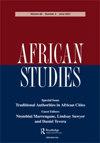The ‘two democracies’ and Africa’s burden
IF 1
4区 社会学
Q2 AREA STUDIES
引用次数: 0
Abstract
ABSTRACT There is a common view that democracy is the best form of government. Today, most societies have accepted this view as a truism. In Africa, and consistent with this view, there has been numerous moves towards democratising not just society as whole but also various institutions. Although this push is commendable, the form of democracy that is instantiated in many African nations or societies does not seem to reflect the ‘genuine’ form of democracy. Through conceptual analysis, I explore what may be referred to as the ‘two democracies’ or two forms of democracy, as part of my general discussion of democracy and its problems. One form of democracy is exhausted or captured by the formal elements and the other form by both the ‘formal’ and ‘virtuous’ elements, where the latter may be said to be the genuine form of democracy and the former a ‘pseudo or false’ form. I claim that democracy, as an ideal, contains or embeds elements, which can be understood in terms of the formal and virtuous elements – both of which constitute the necessary and sufficient conditions for democracy. As part of this discussion, I highlight how the failure by African nations to instantiate the ‘genuine’ form of democracy prevents the actualisation of the dividends of democracy. I claim that the problem in many African societies in respect of the practice of democracy seems to be that only the formal elements are emphasised. Ultimately, the conclusion that I gesture towards is that the seeming neglect of virtuous elements may be robbing African states not only of the instrumental benefits of democracy but also the intrinsic benefits of democracy.“两个民主国家”和非洲的负担
摘要人们普遍认为民主是最好的政府形式。今天,大多数社会都接受了这一观点,认为这是真理。在非洲,与这一观点相一致,已经采取了许多行动,不仅使整个社会民主化,而且使各种机构民主化。尽管这种推动值得赞扬,但许多非洲国家或社会所体现的民主形式似乎并没有反映出“真正的”民主形式。通过概念分析,我探索了什么可以被称为“两个民主”或两种形式的民主,作为我对民主及其问题的一般性讨论的一部分。一种形式的民主被形式元素耗尽或俘获,另一种形式被“形式”和“道德”元素所俘获,后者可以说是真正的民主形式,前者是“伪或伪”形式,这可以从形式要素和道德要素来理解,这两者都构成了民主的必要和充分条件。作为这次讨论的一部分,我强调了非洲国家未能实例化“真正”的民主形式是如何阻碍民主红利的实现的。我声称,许多非洲社会在民主实践方面的问题似乎只是强调了形式因素。最终,我的结论是,似乎忽视了道德因素,这可能不仅剥夺了非洲国家民主的工具性利益,也剥夺了民主的内在利益。
本文章由计算机程序翻译,如有差异,请以英文原文为准。
求助全文
约1分钟内获得全文
求助全文

 求助内容:
求助内容: 应助结果提醒方式:
应助结果提醒方式:


